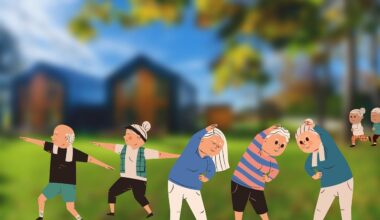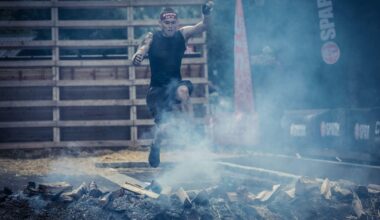The Importance of Reflexes in Chessboxing
Chessboxing cleverly combines two distinct disciplines: chess and boxing. Understanding how reflexes enhance performance in chessboxing is pivotal for athletes engaged in this unique sport. Reflexes facilitate quicker responses during boxing rounds, as fighters need to anticipate the opponent’s next move. This agility is essential when dodging punches or executing counterattacks. On the chessboard, sharp reflexes also play a crucial role. Competitors must process their opponent’s strategies rapidly to devise effective counter-strategies. Thus, reflexes act as a critical bridge between physical and mental agility. Training not only helps athletes improve their boxing techniques but can also augment their cognitive capacities, sharpening their reflexive decision-making skills. Engaging in drills from both sports optimizes this critical interplay of skills. For instance, sparring can improve reaction times, and chess puzzles sharpen mental resilience. Ultimately, success in chessboxing derives from mastering the synergy of both physical prowess and mental acuity.
To effectively train for chessboxing, athletes should incorporate reflex-focused exercises that target both faculties. One valuable strategy involves practicing shadow boxing while simultaneously visualizing chess scenarios. This integrated approach reinforces both mental and physical preparedness. For example, while throwing punches, an athlete might mentally simulate a chess move or puzzle. Furthermore, speed training drills, such as using a double-end bag for boxing, can enhance overall reflexes. These drills refine coordination and timing, crucial aspects in both aspects of the sport. Board exercises should also not be neglected—rapid pattern recognition through tactical exercises sharpens an athlete’s ability to react swiftly during matches. Utilizing chess software or apps can facilitate this training. As a blended discipline, time management becomes an essential element. Practicing time-controlled chess games adds an extra layer of pressure, simulating real competition conditions. Furthermore, fighters can also engage in interval training for boxing. This combination can lead to improved fitness levels and better reflexes. Ultimately, building a regiment that emphasizes reflexes will likely yield positive results.
The Influence of Mental Condition
Focusing on refining an athlete’s mental condition is paramount for a successful chessboxer. The ability to maintain composure during an intense bout is incredibly important and directly affects reflex efficiency. Stress management techniques such as meditation or guided visualization can bolster this resilience. These practices help athletes to react calmly under pressure, which ultimately aids in improving reflexes. Competitors who practice these techniques can better assess their situations in real-time, allowing for quicker, more effective strategic moves on the chessboard. Similarly, in a boxing ring, remaining calm while dodging punches enhances the ability to react swiftly. Staying alert and maintaining high levels of focus fosters greater awareness of the opponent’s actions during matches. Moreover, conditioning one’s mind to be adaptable can improve the effectiveness of reflexes. Athletes should also analyze past matches to identify patterns in their reactions or those of their opponents. This insight enables them to train specifically on areas requiring improvement. Therefore, it is clear that mental practices significantly enhance reflex responses, benefiting athletes in both their chess and boxing disciplines.
Moreover, nutrition plays a crucial role in the enhancement of reflexes in chessboxing. Consuming a well-balanced diet rich in essential nutrients significantly impacts cognitive function and physical performance. Foods such as lean proteins, healthy fats, and vitamins contribute to overall energy levels, allowing athletes to train harder and longer. Hydration is another key factor that can affect both reaction times and cognitive function. Dehydration can impair reflexes, making it vital to drink ample water during training. Additionally, the incorporation of omega-3 fatty acids, found in fish and flaxseeds, can foster brain health and improve cognitive functions, including memory and processing speed. Antioxidant-rich foods, such as fruits and vegetables, can also protect brain function. Pre-training meals should consist of easily digestible carbohydrates for sustained energy. Experimenting with nutrition timing can help athletes find their peak performance windows. Some competitors use nutritional supplements to support their rigorous training regimens. However, one must consult a dietary expert before making drastic changes. Thus, proper nutrition significantly supports reflex development, ultimately improving performance across both arenas.
The Role of Physical Conditioning
Physical conditioning stands as an essential element of enhancing reflexes in chessboxing. The synergy between strength training, cardiovascular fitness, and flexibility directly impacts an athlete’s reflex response. Incorporating plyometric exercises and agility drills into training regimens boosts explosive power and improves reaction times. Components such as footwork and speed are crucial in boxing, where athletes must change direction swiftly to dodge or attack an opponent effectively. Similarly, maintaining balance is vital for executing strategic moves on the chessboard. Core strength exercises can enhance a fighter’s stability and, consequently, their reflexive abilities. Exercises such as planks and rotational movements ensure that the necessary muscle groups engage for optimal performance. Additionally, endurance training plays a significant role by ensuring that athletes can maintain high performance levels through the entire competition duration. A physically conditioned athlete will experience less fatigue, allowing for quicker decision-making during bouts. Hence, training programs must strategically combine these elements. By carefully designing workouts, athletes can effectively improve their physical conditioning and, in turn, sharpen their reflexes.
Next, sparring sessions offer invaluable opportunities for improving reflexes in chessboxing. These real-time engagements compel athletes to react instantly to unpredictable movements. Sparring allows individuals to experiment with various defensive and offensive strategies, honing both their combat and chess skills. Adapting to a live opponent helps sharpen reflexes as athletes learn to read their opponents’ intentions quickly. This is where the crossover of skills comes into play; quick reactions in boxing immediately transfer to rapid decision-making in chess. Regular sparring also builds mental fortitude, essential during high-pressure matches. Many chessboxing athletes incorporate simulated bouts, combining chess moves with physical reactions to create a comprehensive training experience. Athletes should aim for consistency; regularly scheduled sparring sessions help maintain high levels of preparedness. Furthermore, reviewing past sparring experiences aids in understanding personal strengths and weaknesses. Emphasizing feedback from coaches and peers is invaluable because it contributes to refining techniques. Thus, engaging actively in sparring practices will naturally enhance athletes’ reflex abilities by immersing them in real-world competition.
The Path to Improvement
Lastly, persistence in training is paramount for improving reflexes in chessboxing. Building both mental and physical reflexes requires a commitment to consistent practice and refinement. Athletes must remain engaged in progressive training routines that challenge their current capabilities. Incorporating a variety of training forms keeps workouts interesting and engaging. Regular assessments of performance—both physically and mentally—are vital for tracking improvement. Setting specific goals can drive motivation and focus during training. Athletes should diversify their methods by integrating different techniques from boxing and chess into their practice. For example, alternating training sessions between intense physical drills and focused cognitive tasks can facilitate balanced development. Peer support and collaboration can also enhance the learning process, prompting athletes to refine their skills together. Building a community around the sport fosters a sense of accountability and support. Finally, understanding that improvement takes time is essential. Athletes should embrace small victories along the way. With dedicated practice, both physical and mental reflexes will flourish, leading to greater success in the unique discipline of chessboxing.


